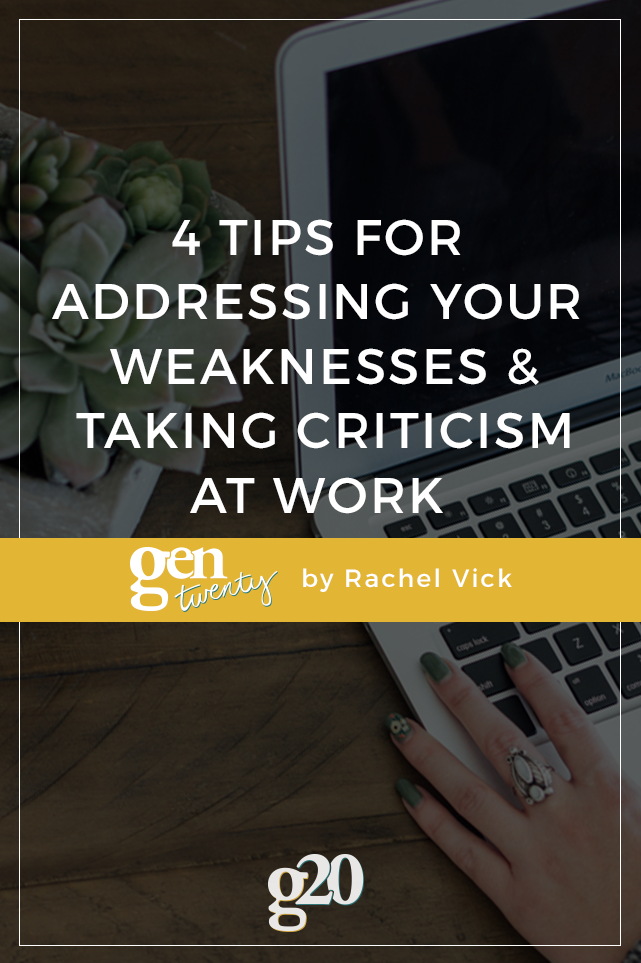
I’ve taken criticism poorly my entire life. I’ve always been envious of those who are able to sit back, listen to someone spew off their weaknesses and channel it to come out happier and better on the other side.
I HATE feeling like I’m doing something poorly or messing things up for my teammates, friends or coworkers.
And what I hate more is that those teammates, friends or coworkers are noticing it and giving me criticism.
I’ve always seen criticism as, “Here’s everything you’re doing wrong,” when I should have been looking at it as, “Here’s how I want to see you grow.”
Part of my reaction is me being a perfectionist, and part of it is just me being human.
No one likes to hear what they’re doing wrong, but the way they use that feedback is what sets them apart.
Addressing my weaknesses has actually been one of my weaknesses for a long time–so last year, I set out to figure out how to do this better, by reading books on the topic, talking to mentors and practicing.
I learned a lot about myself, and the way humans address weaknesses.
1. Try to remember that it’s not personal.
Remember that realizing and improving your weaknesses does not mean the world is ending. Just because you aren’t perfect doesn’t mean you’ve been “found out” and no one is going to like you anymore.
We ALL have weaknesses and things we can improve on; it just stings a little bit more when you have to come face to face with that weakness and feel like you’re letting others down.
Instead of making a sour face and pouting about how awful you feel you are, take the opportunity to use the feedback.
Remember that it wasn’t personal, and whoever was giving you the feedback probably didn’t do it to make you feel like you suck at everything.
Use the time and advice they give you, or seek out advice from a mentor you trust, and write down the improvements that you want to make.
2. Take small steps toward improvement.
When one of my friends pointed out that I really wasn’t aware of what’s going on in the world and it’d be beneficial to think more globally, I (probably) got mad for a while and then decided to do something about it.
I set my alarm for an hour earlier every Wednesday so I can get up and watch the news. While the Skimm is handy every other day of the week, it’s nice to dedicate just one hour a week to improving how I think about the world and what’s going on around me.
It feels like I’m making improvements in my life without taking away from the things I’m already doing.
Also, tackling a simple goal like being more globally-minded is something that helped me in many areas of life–not only was I able to have a better mindset at work, I was also able to participate more conversations about the world, with coworkers, family and friends.
[Tweet “Goal tip: Tackling a small, simple goal will help you in all areas of your life.”]
If you’ve got a long list of things you want to improve on, don’t tackle them all at once. Take your goals a little at a time, or one goal at a time if you have to. Whatever works best for you to get closer to turning your weaknesses into strengths, adapt and do it.
3. Practice.
Have a close friend or family member give you an honest opinion on one of your weaknesses.
Practice addressing and channeling that weakness with them. It’s never fun when you have to do this at a performance review or in a serious situation, so practicing in a lighter environment with someone you know well can get you a little prepared.
4. Accept that you will never be perfect.
It’s the hard truth. And it took me YEARS to realize. You can list every single weakness that you have and do your best to get better, but you will never be the perfect individual that, if you’re like me, you strive for. All you can do is do your best.
In case you’re feeling like the only one in the world who hasn’t reached all their goals and lived their best life, cut out the things in your life that cause you to see the world as so.
Stop following models, fitness icons or even friends that use social media to show everyone they have it all together. It might be motivating, but there’s a point when it becomes discouraging and unrealistic.
All you can do–and all anyone can ask you to do–is to be your best self. And this comes with knowing that you’ll have strengths and weaknesses, good days and bad days.
[Tweet “Bad days build better days.”]
In time, perfect will start to feel like less of a goal, and the criticism you receive will start to feel like less of a blow to your character.
